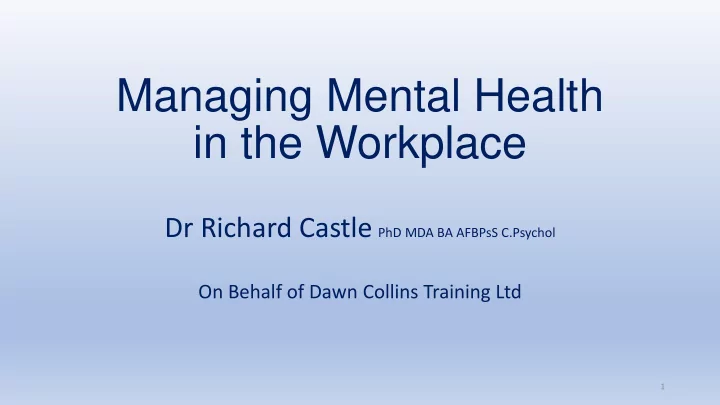

Managing Mental Health in the Workplace Dr Richard Castle PhD MDA BA AFBPsS C.Psychol On Behalf of Dawn Collins Training Ltd 1
I I am not Dawn Collins! 2
My Workplace(s) 3
Next xt Steps in Meeting Mental Health Needs • What are we Aiming to do? • Understand the Motivation (Legal, Moral, Good Employer) • What are the Barriers to treating Mental Health on a par with Physical Health? • And how can these “Barriers” be overcome? • Organisational Awareness, Reduce Stigma, Resources Available • Role of Mental Health First Aid • Thinking the Unthinkable 4
What are we aiming to do? • Achieve Statutory Compliance • Health & Safety at Work Act 1974 (Section 2) • Equality Act 2010 • Understand that State of Mental Wellbeing affects People • Achieve a Positive Approach to Mental Wellbeing • Point One: Understand what’s going on 5
6
What’s Going On? Sources of Stress Moderating Factors Potential Effects ☺ Organisational Organisational Psychological Factors ☺ Work- Social Life Individual Domestic Factors Biological 7
8
9
10
11
12
13
8 Minutes FA CUP FINAL, MAY 2014 Arsenal 0, Hull City 2 120 Minutes Arsenal 3, Hull City 2 14
15
Maths Test 1 x 3 = 3 2 x 3 = 6 3 x 3 = 8 4 x 3 = 12 16
Maths Test 1 x 3 = 3 √ 2 x 3 = 6 √ 3 x 3 = 8 X 4 x 3 = 12 √ 17
What are we aiming to do? • Point One: Understand what’s going on • Point Two: Influence perceptions of Mental Wellbeing 18
What can Leaders do Daily to create a supportive Culture of f Mental Wellbeing? • Normalise Mental Wellbeing (Team Meetings etc) • Open Communication • Be Approachable • Setting an Example; Model Healthy Behaviours • Care over use of Language • Adopt HSE Management Standards in respect of Mental Wellbeing 19
HSE Management Standards Key Drivers of f Mental Wellbeing at Work • Demands • Control • Support • Relationships • Role • Change Management • Point Three: Risk Audit based on these Criteria underpins Cultural Shift • Team/Union Engagement in Process 20
Having that Conversation….. 21
What are the Barriers? 22
What are the Barriers? • Don’t know how to start the Conversation • Fear of Reaction/Making things worse • Fear of lack of knowledge/Skills to take forward • Time • Environment • Not Your business • Old School thinking • Culture of Department (Task/Performance focused) • What if not direct line manager • Knowing what support is available 23
The basics………… • Identify Support from HR/OH/EAP before the meeting • Choose a Setting, and a Time • Keep the chat positive and supportive, exploring the issues and how you may be able to help • Keep body language open and non-confrontational • Listen non-judgementally, and take them seriously • Don’t offer insensitive and thoughtless advice • Take into account cultural sensitivities 24
Potential Solutions • Reasonable Adjustments • e.g. Adjustment to working hours, performance objectives etc, advance of pay • Encourage Professional Support • e.g. Mediation, GP, IAPT, Support Groups • Encourage self-help Strategies • e.g. Mindfulness, Music, Art, new Hobbies • Document and Agree follow-up actions • Point Four: Training to instil Confidence 25
Mental Health First Aid Training 26
Mental Health First Aid England Social Mission to: • Increase knowledge and understanding about mental health • Increase confidence in mental health skills to support others • Challenge and Reduce mental health related stigma and discrimination • Evidence-based and workplace-orientated training packages: • 2-day (Mental Health First Aiders) • 1-day (Mental Health Champion) • 4-hour (Mental Health Aware) 27
Mental Health First Aid England Intervention Tool (ALGEE) • Approach the person, assess and assist with any crisis • Listen and communicate non-judgementally • Give support and information • Encourage the person to get appropriate professional help • Encourage other supports 28
What are the Barriers? 29
Royal Air Force Experience • Identified rise in non- deployable people; link to Anxiety and “Stress” • Stress Audit (cross-rank team composition) • Identification of major stressors • Reduce risk factors (ie, deployment roulements) • Develop mental health awareness training • Changes to post-deployment routines • Introduction of RAF Stress Management and Resilience Policy • Issued to all ranks on a personal basis • Worldwide Roadshow 30
RAF Formations Worldwide 31
Thinking the Unthinkable • What would you do if your organisation was involved in a Disaster? • Would you know how to react, and to support your people? 32
The basics of responding to trauma… • If someone is bleeding, you don’t ask them how they got the cut, you just want to help them in the moment….. • Why is it so different in dealing with mental health injuries? • Avoid Intrusive questions • Look (for people in distress), Listen, Link • Reassure them that their psychological response (heightened alert, tearfulness, sleep disturbance, irritability etc) is the brain’s normal response to an abnormal event (for 6-8 weeks) 33
In In sum • We know Mental Health matters • But do we know the stressors within our own organisations? • How can we reduce the stigma of mental health, and intervene successfully? • Prevent, Detect, Respond, Train • Understand what it is we are trying to prevent, and why • Detect principal stressors and attitudes which are making things worse • Respond by cultural change and daily model behaviour • Increase awareness of mental health through training and normalisation within HSW world 34
Thank you, , and Stay Safe Dawn Collins Training Ltd dawncollins.mhfa@gmail.com 35
Recommend
More recommend